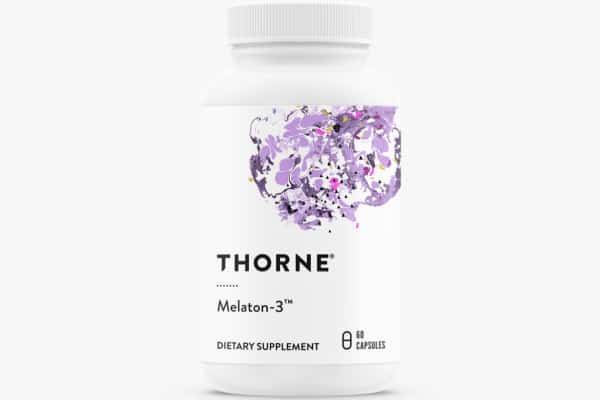Melatonin for dogs? You’re probably familiar with melatonin as a common over-the-counter sleeping aid for humans with sleep-wake disturbances or jet lag. But did you know this incredible hormone also has benefits for our canine friends? In part one of this three-part series on melatonin for dogs, integrative veterinarian Dr. Julie Buzby answers your questions: what is melatonin, is melatonin safe for dogs, what are the pros and cons, and more.

- How melatonin helped calm a rescue dog
- What is melatonin?
- Is melatonin safe for dogs?
- Is human melatonin safe for dogs?
- Potential side effects of melatonin in dogs
- What are the kinds of melatonin for dogs?
- What conditions is melatonin used for in dogs?
- I’d like to give my dog melatonin. What dosage can I give?
- What are the pros and cons of melatonin for dogs?
- Marvelous melatonin
- What questions do you have about melatonin for dogs?
How melatonin helped calm a rescue dog
Several years ago, my family adopted our dog, Zeke, from animal control. He was a shy, black mutt whose haunting eyes conveyed a checkered past. This was our second time adopting a shelter dog. Many of the challenges were the same with Zeke as with our first dog—housebreaking, learning to walk on a leash, and crate training. The latter proved to be more difficult than I’d anticipated, but we persevered with positive training.
One night, when everyone in our family was whining, including our beloved Zeke, I gave my dog melatonin to settle him. It was the turning point in our dog’s relationship with his crate.
Despite the fact that Zeke was now living his best life, his history left him with some anxiety issues, especially with regard to separation anxiety and confinement. Understandably so! As a veterinarian, I wouldn’t necessarily reach for melatonin as a first-line treatment for more severe anxiety issues in dogs, but for Zeke it was enough to “take the edge off.” Melatonin let him realize his crate was a safe space.
My own dog’s success story prompted me to research and share all the marvels of melatonin, and its many uses in both humans and our pets. Let’s take a look at how it might help some of our canine companions. (And for further discussion, see parts two and three in this series: Can I Give My Dog Melatonin? and Canine Cognitive Dysfunction and Melatonin.)
What is melatonin?
Melatonin is a naturally occurring hormone—an incredible one, at that—that is produced by the pineal gland in the brain of humans and many animals including dogs.1,2,3,4,5,6 The pineal gland is responsible for managing sleep-wake cycles (AKA our circadian rhythm) in humans.4
Other organs such as the eyes, skin, bones, gastrointestinal tract, platelets, and thymus all produce melatonin, but to a much lesser degree than the pineal gland.5 Melatonin is created during the process that converts tryptophan to serotonin, a chemical in the brain associated with happiness.3,6

Melatonin is produced in response to exposure to darkness. 1,3,6 For example, levels of melatonin are ten times higher at night than they are during the day.6
The seasons also affect melatonin production, with overall melatonin levels starting to rise in the autumn as daylight grows shorter and achieving peak levels at the longest day of the year, the winter solstice.3 After melatonin is produced, it crosses the blood-brain barrier and enters the body and cerebrospinal fluid (CSF).6
As an aside, exposure to light at night blocks the production of melatonin. This has been shown to cause sleep disturbances in people who use electronics that emit light at night. Researchers have found that light from electronic devices can block the release of natural hormone melatonin at night.
Is melatonin safe for dogs?
The good news is that melatonin is incredibly safe for many dogs. Overall, it remains in the body for a very short period of time. The half-life of melatonin is only 18.6 minutes in the dog, which means it is rapidly cleared from the body.5 It’s usually fully cleared within 24 hours.
However, there are two important exceptions. Melatonin may cause insulin resistance, so I try to avoid it in my diabetic canine patients. Also, because melatonin is metabolized in the liver and eliminated through the urine and feces, caution is advised for dogs with liver disease or dysfunction.4,5,6
Along the lines of safety, it’s important to call out that, unlike prescription medications, melatonin is considered a dietary supplement. Therefore, it is not regulated by the FDA. Unfortunately, without FDA regulation, we can see variability in some nutraceuticals—melatonin is no exception. Make sure you’re buying a brand of melatonin that is well-known and trusted by your veterinarian.
Is human melatonin safe for dogs?
Generally speaking, as a veterinarian, I consider human melatonin safe for dogs. The big exception to this is melatonin gummies. Some gummies contain the sweetening agent xylitol, which is harmless in people but incredibly toxic to dogs.
Beware of xylitol in melatonin supplements
Most importantly, pet parents should avoid formulations of melatonin that contain xylitol (sometimes called birch sugar). While melatonin itself is very safe, xylitol is HIGHLY toxic to dogs. For more information about the dangers of xylitol, please read my article: Xylitol and Dogs. (Your dog is counting on you to keep him or her safe from this poison in your pantry.)

Potential side effects of melatonin in dogs
In dogs, side effects of melatonin are typically minimal, but any medication or supplement can have potential side effects. I recommend speaking with your veterinarian before giving your dog a melatonin supplement (or any supplement), even if it is an over-the-counter medication.
Here are some possible side effects of melatonin in dogs:
- Drowsiness—Because melatonin is the hormone responsible for sleep, drowsiness is expected.
- Effects on reproductive hormones—Because melatonin is a hormone, it may demonstrate effects on reproductive hormones.3,4
- Interactions with other medications—Melatonin may also interact with some of your dog’s other medications. If your dog is on medication or a sedative for treating anxiety, melatonin may cause an increase in the side effects such as drowsiness or lethargy.4 Melatonin may also decrease the effectiveness of certain blood pressure medications.5
With that said, one of the veterinary pharmaceutical handbooks advised treating dogs who had eaten a large quantity of melatonin by pumping the stomach.5 However, the reason they advised pumping the stomach was not because of the toxic effects of melatonin. Rather, it was to prevent a “stone” from forming in the gastrointestinal tract from the inactive ingredients used in the tablets.5 You know it’s a safe medication when the reference guide is more concerned about the tablets creating a “foreign body” than the drug itself!
A note about the use of melatonin in dogs with seizures
Melatonin has been shown to have both anticonvulsant and proconvulsant properties in humans and laboratory animals. Anecdotally, the same seems to be true of dogs. Some veterinarians reported that starting melatonin for another issue (e.g., seasonal alopecia) in dogs with a history of seizures may have increased the dog’s seizure frequency. However, others felt that it may have helped control their patient’s seizures (in combination with other anti-seizure medications).
It is hard to know for sure what, if any, relationship melatonin has on seizures since seizures are a complex entity. Thus, if your dog has a history of seizures, it is best to talk to your vet before starting melatonin.
What are the kinds of melatonin for dogs?
A quick online search will turn up dozens of options of melatonin supplements for dogs, in addition to the over-the-counter formulations geared toward humans. Like any over-the-counter medication, however, it’s important to make sure that the amount of melatonin given is appropriate and safe.

There are various forms of melatonin supplements, for both humans and dogs—capsules, tablets, chews—they even make liquid melatonin for dogs! “Regular” melatonin (not the extended release formulations) seem to be best for dogs. This is the case because the extended release products created for humans may pass through your dog’s GI tract too quickly to release all the melatonin, making them potentially less effective or variable in their efficacy.
The type of melatonin supplement you choose can be based on the size and temperament of your dog, the condition you’re treating, as well as cost. For example, if your dog isn’t tolerant of tablets, one of the liquid forms may be easier to administer. Talk to your vet about which type or brand he or she recommends for your dog.
What conditions is melatonin used for in dogs?
As mentioned, melatonin has been used in humans who have trouble falling and staying asleep or who are adjusting to time changes associated with jet lag.1 Also, there is evidence that melatonin may help with some autoimmune conditions.1
Interestingly, this “hormone of hibernation” may be a sleep aid and more. Melatonin may be helpful in managing many medical conditions in dogs.1,3,4,5 Melatonin may help treat:
Altered sleep cycles and wake cycles associated with dog dementia — Because my current veterinary practice primarily serves senior dogs, I routinely recommended melatonin supplements for “doggie dementia.” Some older dogs’ sleep and wake cycles get off track, they can suffer from anxiety, etc. For more on melatonin supplements and doggie dementia, please read my article on canine cognitive dysfunction in dogs.
Altered sleep cycles and wake cycles associated with blindness in dogs — Because melatonin production increases with darkness, blind dogs may not have adequate production without the visible light/dark cycles. Giving supplemental melatonin may help balance these levels out and help blind dogs sleep through the night more consistently.
Immune-mediated thrombocytopenia — Although there is very little information on this in veterinary medicine, there have been human case reports of melatonin being useful for immune-mediated thrombocytopenia (IMTP). The precise mechanism is not yet well understood, but melatonin may increase platelet production. Increased numbers of platelets may potentially help prevent excessive bleeding in dogs with IMTP.
Alopecia (hair loss) — This is another condition where the way in which melatonin can be helpful is not well established. Some dogs experience seasonal alopecia, where their hair thins or falls out during the winter months when days are shorter. Just like it can help level out seasonal disturbances in circadian rhythm, melatonin supplements can help to lessen the effects of seasonal alopecia in dogs.
Anxiety (including separation anxiety) — One of the effects of melatonin is a reduction in the brain chemical dopamine. Too much dopamine can lead to anxiety. Reducing dopamine levels can improve signs of anxiety, particularly separation anxiety, in some dogs. There are many options for treating canine anxiety, including environmental enrichment, medications, supplements, and others. This is another area where I strongly encourage you to talk with your vet before starting a course of treatment. You can work together to determine the best treatment plan for your dog.

Cancer — Melatonin may have anti-cancer properties, particularly in estrogen-related cancers, such as mammary cancer in dogs. Melatonin can interfere with cancer cells’ estrogen receptors, and can reduce tumor growth in some cases.9
Atypical Cushing’s disease — Cushing’s disease in dogs (hyperadrenocorticism) is caused by overproduction of cortisol by the adrenal glands. Melatonin inhibits certain enzymes and can decrease cortisol levels. One of the symptoms we commonly see in dogs with Cushing’s disease is hair loss; melatonin can be beneficial for hair regrowth just like in dogs with seasonal alopecia.
I’d like to give my dog melatonin. What dosage can I give?
If you think your dog has a condition where he or she would benefit from melatonin, please speak with your veterinarian. Melatonin supplements are safe in the vast majority of dogs, but it is always a good idea to make sure the supplement will not interact with any other medications your dog might be taking.
If your vet feels that your dog is a good candidate for melatonin supplements, he or she will recommend the correct dosage.
What are the pros and cons of melatonin for dogs?
To summarize, there are many pros and few cons of melatonin for dogs.
| PROS | CONS |
| Can help treat a number of conditions: dementia, anxiety, hair loss, cancer, and maybe others | Can cause drowsiness |
| Large margin of safety in dogs | May cause drug interactions with certain other medications |
| Inexpensive | Can cause insulin resistance in diabetic dogs |
| Comes in a variety of formulations | Certain formulations contain xylitol, which is not safe for dogs |
| Does not require a prescription | Not FDA regulated so there may be variability |
| Few and generally mild side effects | |
| Short acting | |
| Widely available |
Marvelous melatonin
I had never thought about using melatonin the way I did with my dog that night. Zeke’s success prompted me to spend quite a bit of time researching this marvelous hormone. I was stunned by all the research studies I found that referenced melatonin for treating a variety of medical conditions. If you’re interested in taking a deep dive into the marvels of melatonin, you can find my sources below.
Whether your dog’s feeling anxious or your grey-muzzled companion needs nighttime rest, take stock in melatonin—the miracle hormone.
What questions do you have about melatonin for dogs?
Please comment below. We can all learn from each other.
Sources:
- Byers, C G. “Just Ask the Expert: Is There a Role for Melatonin in Dogs and Cats with IMHA?” DVM360, 27 July 2017, veterinarymedicine.dvm360.com/just-ask-expert-there-role-melatonin-dogs-and-cats-with-imha.
- Jeromin, A M. “Seasonal Affective Disorder Can Be Culprit for Canine Hair Loss.” DVM360, 1 Apr. 2003, veterinarynews.dvm360.com/seasonal-affective-disorder-can-be-culprit-canine-hair-loss.
- “Melatonin and Seasonal Alopecias.” Veterinary Practice, 1 Nov. 2013, veterinary-practice.com/article/melatonin-and-seasonal-alopecias.
- “Melatonin.” Plumb’s Veterinary Drug Handbook, Veterinary Information Networm, 1 Jan. 2015, www.vin.com/members/cms/project/defaultadv1.aspx?id=4692338&pid=451&.
- “Melatonin.” VIN Veterinary Drug Handbook, Veterinary Information Networm, 30 June 2017, www.vin.com/members/cms/project/defaultadv1.aspx?pId=13468&id=7868548.
- “Melatonin: Side Effects, Uses, Dosage (Kids/Adults).” Edited by L Anderson, Drugs.com, 26 Mar. 2019, www.drugs.com/melatonin.html.
- Reiter, R J, et al. “Melatonin, a Full Service Anti-Cancer Agent: Inhibition of Initiation, Progression and Metastasis.” Int J Mol Sci, vol. 18, no. 4, 2017, doi:10.3390.
- Rosenthal, M. “When Pets Lose Their Sense Of Place.” Veterinary Practice News, 9 July 2013, www.veterinarypracticenews.com/when-pets-lose-their-sense-of-place/.
- Lopes, J R, et al. “Evaluation of melatonin treatment in primary culture of canine mammary tumors.” Oncol Rep, vol. 33, no. 1, 2015, doi:10.3892.


I’ve been advised to give my dog melatonin to help with seasonal alopecia. There are so many different formulas on the market. Is it best to give the drug free formula or not? I know to stay away from anything with xylitol in it. Please help.
Hi Katie,
You are right, there are TONS of options when it comes to melatonin! I understand how this can be very confusing and stressful when trying to choose a product for your dog. All melatonin should be “drug free”. The meaning of having this on the label is just to let consumers know that melatonin is not considered a drug but is labeled as a supplement and is therefore not regulated by the FDA. My advice is to go with a brand you know and trust. Your vet may have a favorite and could guide you in the selection process. Hoping this will help make your decision making go a bit smoother. Best of luck to you and your pup!
Hi Dr Busby, can we give 2mg slow release melatonin rather than the standard melatonin to a senior Maltese with cushings disease? He weighs 6 kgs. Thanks
Your feedback would be greatly appreciated
Hi Susan,
I hope you saw my reply to your first question that I responded to on 12/19. Extended-release melatonin is not recommended for dogs as it could pass through their GI tract too quickly to have its full effect. As always, if you have concerns about your dog’s medications it would be best to discuss them with your vet. Best wishes to you and your senior pup.
Hi, why do you not recommend prolonged release melatonin for senior dogs with cushings? What is the difference between the prolonged release and normal melatonin.. Thanks
Hi Susan,
Thank you for bringing up this important point! Normal melatonin is considered “instant release”, and you get the full effect right away. Extended release allows the medication to be slowly absorbed by the body and takes much longer for the full dose to become available. The reason why extended-release formulas of melatonin are not recommended for dogs has to do with the specific way their bodies function. The transit time for food or medications to move completely through a human body takes longer than it does for dogs. Because things move through a dog’s GI tract faster, there is a chance the extended-release medication could come out in the feces before it has time to deliver the full dose needed. Also, the transit time through a dog’s GI tract can vairy from day to day depending on what the dog’s diet consists of. So, with extended-release medications, you run the risk that they will vairy in their effectiveness if they even work at all. I am so glad you asked this question and we have updated the article to address this in more detail. Again, thank you! And best wishes!
Hi Dr Buzby- I wanted to point out that if a drug “lowers the seizure threshold” that means seizure frequency will increase, not decrease. So a dog with seizures should not be taking melatonin – it will definitely not treat seizures. You may want to change your article because the current advice could be dangerous.
Hi Deborah,
Thank you for bringing this to our attention! The wording has been changed and article updated to reflect the most current information available. I appreciate your honest concern for other readers and their beloved pups!
My pups have a hard time sleeping and their weight is around 12 to 15 lbs and I give them 3mg of melatonin at night before bed but it only seems to work for around 3 hours, why is that when I have friends that give their even larger dog less and it seems to work all night for them?
Hi JC,
I am sorry the melatonin is not producing the results you had hoped for. Every dog is different and may not respond the same way. I recommend you discuss these concerns with your vet. They can evaluate the dosage and see if it needs to be changed or if a different course of treatment would work better for your dogs. Hoping you can all get some rest soon!
sounds like a great safe hormone. thank you
Hi Dr. Julie,
My 12 year old Maltese is diabetic and blind which all came on quite suddenly. He has a hard time relaxing and also startled from sleep and panics and these episodes can last anywhere from an hour to three or more. Vets have prescribed Gabapentin and Trazadone and Alprazolam which helped right away but started to not work so well except for causing him to stumble and be out of it. My new vet suggested melatonin and I started using it and it had better results than I had seen with other meds. However I was unaware of checking for xylitol and realized the one I was giving had it so stopped and switched immediately. However, I joined a diabetic dog group who suddenly told me melatonin is not safe for diabetic dogs as it can cause them to be insulin resistant. I asked my vet and she said she didn’t agree. I wanted to know your take on this by chance? I stopped giving it to him but he’s back to struggling again and I’d love to give him a natural supplement other than strong meds. Thank you!
Hi Andrea,
Sorry to hear that your Maltese is struggling with the adjustment to being blind and having trouble resting at night. That is difficult for everyone! It is good that the melatonin was helping him and I’m glad that you noticed the xylitol before it created any problems. There is nothing in our veterinary drug handbook that says that melatonin is contraindicated in diabetic dogs. Also, there have been some studies that indicate that melatonin may actually be helpful in the treatment of diabetes. It may have protective effects on the heart and pancreas, decrease oxidative stress (i.e. imbalance between free radicals and anti-oxidants in the body), and decrease the risk of diabetic neuropathy (i.e. nerve issues). Based on that, I would agree with your vet who recommended using melatonin for your pup. Did your Facebook group happen to mention where they found the information that melatonin may promote insulin resistance?
Here are a few other articles that might be helpful to you as well:
1) Senior Dog Anxiety at Night? 6 Solutions for Better Sleep
2)7 Tips For Living With A Blind Dog
3) For Blind Dogs – a portion of our site devoted to how ToeGrips can help blind dogs feel more confident
4) Also be on the lookout for our article on cataracts which is publishing next month and has a big section on helping your dog adjust to being blind.
Hope that you and your sweet pup are able to have more restful nights soon and he begins to get more comfortable navigating and living as a blind dog. These dogs can still have a wonderful quality of life, but it does sometimes take some time for them to adjust.❤
Our 15 yr old Aussie is pacing and panting most of the night. She is already on Gabapentin 300 mg 2 x day and Trazodone 50 mg 2 x day. It helped in the early days of giving her these meds (per our vet) but it does not seem to be enough now. We could up Trazodone however, she becomes very drugged and stumbles. We have stairs so that is not safe. Could the Melatonin have a different effect? I’m not getting much sleep. My fear is she has to go out to potty so I sleep with one eye open. She is having accidents. ?
Sandy,
What a difficult and exhausting situation for both of you. What you are describing could be classic canine cognitive dysfunction (CCD) but it could also be other things, including pain, so I would urge you to make an appointment with your veterinarian to get their opinion too. If this is CCD, there are a variety of treatments ranging from veterinary pharmaceuticals to more holistic options and also routine/environmental modifications you can make. Melatonin (with your veterinarian’s blessing) could certainly be worth a try. My blog Managing Canine Cognitive Dysfunction in Dogs: Signs, Symptoms, Solutions may help you learn a bit more about CCD and the role of melatonin in CCD. I have also seen pain medication made a world of difference in dogs with similar signs so it will definitely be good to get your veterinarian’s input. I hope that you and your sweet old girl have many restful nights ahead of you soon, and hang in there in the meantime! ❤
I want to give my dog Meletonin, for loud noise and anxiety. But all meletonin products contain xylitol.
Are there melatonin products sold without xylitol??.
Hi Stan, the majority of melatonin tablets do NOT contain xylitol. I think it’s mostly the “sweetened” product formulations, like gummy chews that do. So I’d say keep trying and great job reading the labels! As always, please talk to your veterinarian before administering anything new to your dog. 🙂
This is fascinating Dr. Julie, and could be so helpful for not only anxious pups but I’ll be interested to hear the benefits for senior dogs! How long does it take to work? Does the first dose show a difference or is it something that needs to build up in the body to present its usefulness? I noticed you mentioned it’s helpful for hair loss as well as in some cases, Cushing’s. What is the connection there since it seems to be a “rest” hormone? Keep this good information coming!
Hi Denise, Thanks so much for your curiousity and questions! Here’s our most recent article on melatonin for senior dogs with cognitive dysfunction: https://toegrips.com/canine-cognitive-dysfunction-in-dogs-signs-solutions/ To be honest, I’m not sure we know all the answers to your questions here, but here’s what I can tell you. Melatonin works fast. It is distributed very quickly into the CNS after IV administration in studies. I don’t think we have those types of studies for oral administration, but it works fast after administration and there would not need to be a “loading dose” of several days to see effect for the properties of helping with sleep. (For hair issues related to atypical Cushing’s, it’s a different story, of course) To clarify, it’s not the standard “run of the mill” Cushing’s we’re using melatonin for. It is thought to be helpful in skin conditions such as “alopecia X” and “follicular dysplasia”. More blogs to come with deeper explanations, I promise! 🙂